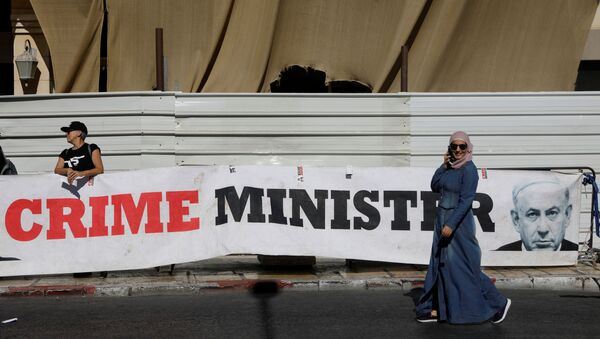However, despite the numerous charges against Netanyahu, there may still be “too many loopholes” to result in conviction of the prime minister, Miko Peled, the author of “The General’s Son - A Journey of an Israeli in Palestine” and "Injustice: The Story of the Holy Land Foundation Five,” told Radio Sputnik’s Loud & Clear.
According to investigators, the prime minister is suspected of promoting the interests of telecommunications company Bezeq and its majority shareholder Shaul Elovitch in exchange for favorable coverage on the Bezeq-owned news website Walla!, Sputnik previously reported.
“The Israeli political process, as interesting as it may be, is still just gossip compared to what is really happening in Palestine,” Peled told hosts John Kiriakou and Brian Becker.
“Now, as for Netanyahu himself … the fact [is] that there are too many loopholes, I think, to start opening champagne bottles, because he still has the right, as a member of the Knesset [the country’s legislature] to ask for immunity. But he can’t do that, because the Knesset committees are not in session, because there hasn't been a coalition government, a coalition agreement … Until the committees sit, they won’t be able to give him or discuss the immunity possible for him. So the whole thing may be postponed until the next election,” Peled said.
On Thursday, Israeli President Reuven Rivlin gave the Knesset 21 days to form a coalition government after both Netanyahu and his rival, Blue and White alliance head Benny Gantz, failed to establish a ruling coalition.
"This means that under the law, starting from today and within 21 days, the decision on who will bear the burden of forming the next government is vested in Knesset lawmakers ... This is a serious challenge for the state of Israel,” Rivlin said, Sputnik reported.
According to Peled, the lack of a coalition government means it’s unclear whether Netanyahu will have his immunity stripped, and whether the case against him will proceed.
“So, we won't know until the end of the day today or tomorrow if he’s actually going to be indicted, because he has the right to appear and have the committee to hear his case on the issue of immunity, and then there’s going to be elections, and there’s going to be another year. And so, he’s going to be gaining time. This may or not be the case, but this is part of the reality that we are looking at right now,” Peled explained.
“People are still debating the law [as to] whether or not a sitting prime minister can continue to sit as prime minister, even if he’s convicted. So this is being discussed as we speak right now,” Peled said.”
“It looks like the law says that it can’t. There was a law that was passed after a previous member of the Israeli cabinet was indicted, but it’s not clear if this applies to the prime minister or not. But there will be a lot of pressure on him to resign” if Netanyahu is convicted, Peled added, also noting that the chances of coalition government forming between Likud and Blue and White would be high in that scenario, since Netanyahu is the one standing in the way of a national unity government.
Israel's political statemate began in April when, following elections that saw both Likud and Blue and White gain 35 Knesset seats, Netanyahu was unable to assemble a coalition comprising a parliamentary majority of 61 of the Knesset's 120 members. Netanyahu’s right-wing coalition also failed to secure a majority in the Knesset following a second election in September.



